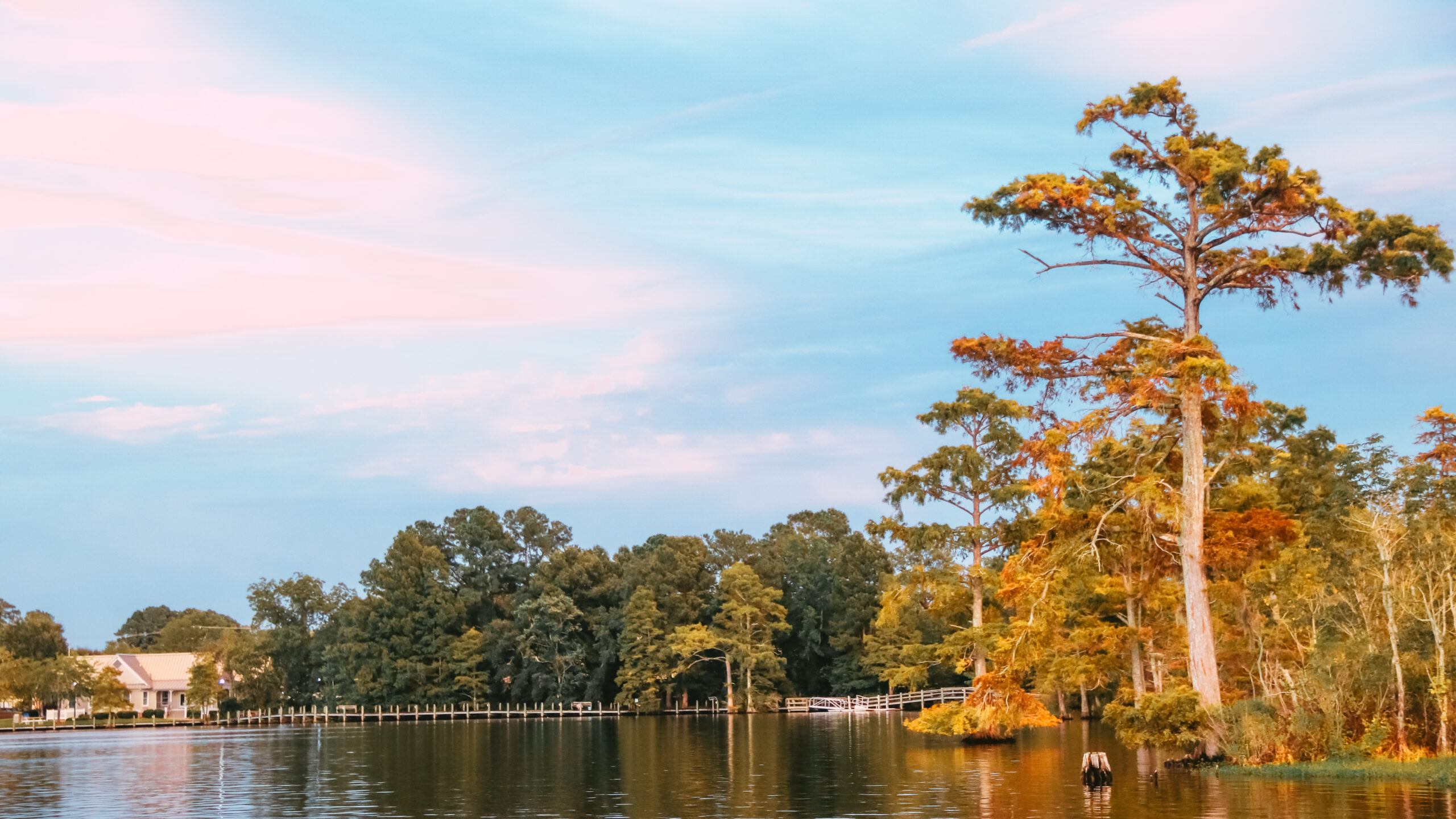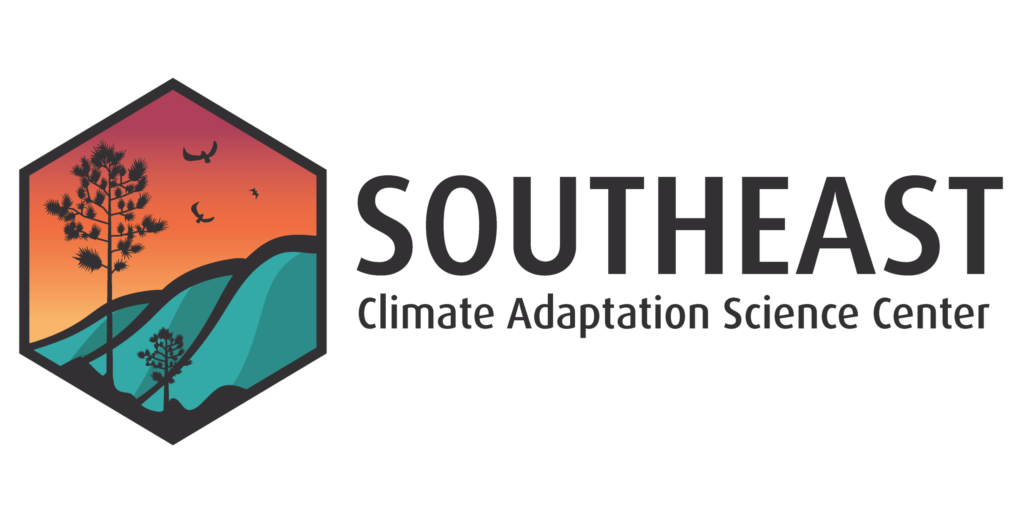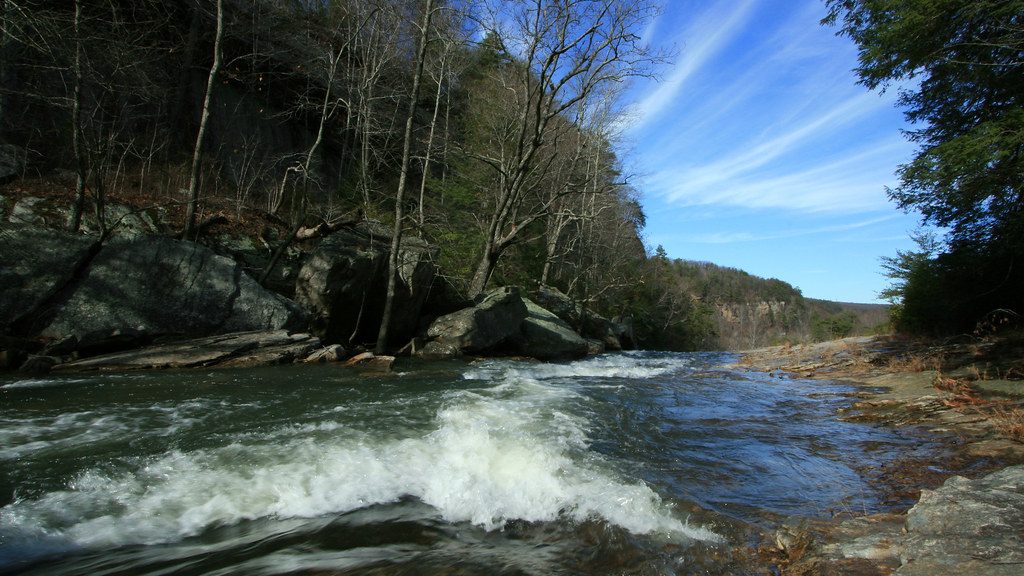September 2023 Newsletter


September 2023 Newsletter
Welcome to the Southeast Climate Adaptation Science Center’s September 2023 Newsletter.
For news and upcoming events related to the Southeast Climate Adaptation Science Center, subscribe to our monthly newsletter
SE CASC News | Resources | Publications | Tribal News | Partner News | Webinars | Events | Opportunities

Southeast Climate Adaptation Science Center News
Join the SC CASC, SE CASC, and USFS for a virtual workshop, Extreme Disturbances and Climate Change: Threats to the Southeast, September 26, 9AM ET. Learn more and register.
Our next virtual SE CASC Science Seminar, Using Deficit Irrigation to Reduce Vulnerability in Food-Energy-Water Nexus, by 2020-21 Global Change Fellow Hemant Kumar (NCSU) will take place on October 19, 11AM ET. Learn more and register.
Mark your calendars for our November SE CASC Science Seminar, Climate Change Impacts on Brook Trout Populations in the Southeastern USA, by PI Yoichiro Kanno (CSU), November 29, 11AM ET. Learn more and register.
Check out our new SE CASC General Information Fact Sheet here.
Our 2022-23 Global Change Fellows developed creative communications products at the end of their term. View them here.
2022-23 Global Change Fellow Bethany Wager received the Conservation Leadership Grant from the NC Wildlife Federation. Learn more.
2020-21 Global Change Fellow Megan Johnson is presenting during the NOAA NIDIS Southeast Climate Monthly Webinar on Climate-Driven Changes in Prescribed Fire in the Southeastern U.S on September 26, 10AM ET. Learn more.
2015-2016 Global Change Fellow & SE CASC Researcher Georgina Sanchez is presenting Reshaping Urban Futures: Embracing Change and Resilience in the Face of Climate Challenges during NC State Library’s Coffee & Viz on October 20, 9:30AM ET. Learn more.
Research Ecologist Adam Terando and Faculty Affiliate Erin Seekamp are co-authors to Tourist Perceptions of Climate Change Impacts on Mountain Ecotourism in Southern Mexico.
PI Jacob LaFontaine is co-author of two SE CASC supported data releases on Modeling Hydrologic Simulations for Past & Future Conditions across the Conterminous US.
Conservation Corridor: Traditional Ecological Knowledge in corridor restoration
Project Spotlight
Assessment of Water Availability and Streamflow Characteristics in the Southeastern U.S. for Current and Future Climatic and Landscape Conditions

Information about streamflow and streamflow variability is critical to assist natural resource managers when they make decisions related to the water needs of both human communities and ecosystems. In order for managers to effectively plan for and adapt to future climate and land cover conditions, they require information on changes that could occur in the distribution and quantity of water resources. Using hydrological models, this project simulates how daily hydrological conditions at a conterminous US extent may change under climate scenarios. This research will also help explore the potential risks to hydroperiod, flooding, and rapid onset drought in our river systems. The research was led by PI Jacob LaFontaine (USGS South Atlantic Water Science Center). Learn more.
Resources
America’s Longleaf 2022 Range-wide Accomplishment Report highlights 2.2 million acres of longleaf management activities across the Southeast. Learn more.
Climpact was developed by the World Meteorological Organization to calculate climate indices that are relevant for the health, agriculture and water sectors. Learn more.
Climate Change and Urban Forests. The District Department of Transportation created this guide sharing the benefits of urban forestry and climate change impacts in D.C. Learn more.
Conservation without Conflict: A Persuasive Step-by-Step Guide to Achieving Collaborative Conservation. The Wildlife Management Institute created this step-by-step guide to embrace voluntary, collaborative conservation practices. Learn more.
How Marine Heatwaves are Changing Ocean Ecosystems. The National Park Service released an interactive story revealing the effects of increased ocean temperatures on seabirds in the Pacific Ocean. Learn more.
Engaging and Incorporating Indigenous Knowledge in Decision-Making. NOAA developed this guidance and best practices for tribal engagement. Learn more.
In the Media
A Medical Toolkit for Climate Resiliency Is Built on the Latest Epidemiology and ER Best Practices | Inside Climate News
Alarm at exodus of climate voices on Twitter after Musk takeover | The Guardian
Extreme Heat is Changing How People Experience the Outdoors | CNR News
Forest can adapt to climate change, but not quickly enough | ScienceDaily
New federal rule puts 2.5 million acres of wetlands in peril | Coastal Review

Notable Publications
Climate-Smart Forestry: Promise and risks for forests, society, and climate
Forests provide vital ecosystem services, materials, and cultural value to society. In wake of climate change, nature based solutions have become increasingly popular among climate adaptation and mitigation efforts. The term “Climate-Smart Forestry” (CSF) has also recently entered conversations offering a connection between forests, society, and climate. Unfortunately, CSF remains poorly defined and implemented. This paper assesses the current definitions and framing of CSF, explores CSF gaps and potential risks, presents a new definition of CSF to expand and clarify CSF, and explores sources of CSF evidence. Link to article.
AI-enabled strategies for climate change adaptation: protecting communities, infrastructure, and businesses from the impacts of climate change
In an era where climate change impacts are imminent and inevitable, artificial intelligence (AI) can serve as a valuable tool to help mitigate and adapt to these changes. With its ability to sort through large sets of data from sources, such as climate models and satellite imagery, AI can inform decision-making pertinent to preparing for an uncertain future. For example, AI can help identify areas that are at high risk of climate-related disasters and then subsequently help businesses and communities prepare for those impending damages. Despite the innovation of AI, important ethical considerations and biases must be addressed to ensure that AI generated solutions are transparent, fair, and equitable. To ensure that AI-powered climate adaptation strategies are inclusive and transparent to all, ethical implications of their development and implementation must be considered. In doing this, the power of AI can be harnessed to develop effective and equitable strategies for climate change adaptation. Link to article.
Enabling Climate Change Adaptation in Coastal Systems: A Systematic Literature Review
Coasts are complex social-ecological systems (SES) that provide many valuable services to various habitats and communities. However due to climate change, coasts are especially susceptible to sea level rise, more frequent and intense storms, altered precipitation patterns, and warmer ocean temperatures. This paper explored 650 peer-reviewed publications on coastal climate adaptation from the past two decades to determine best scientific measures to benefit coastal adaptation to climate change. Six research gaps were defined thus identifying areas where future empirical research can be pursued to fill these gaps and thus assist coastal communities as they adapt to climate change. Through this increase knowledge, SES will become more resilient against climate change. Link to article.
Actualizing Indigenous Knowledge in tribal wildlife management: basic preconditions
The term Indigenous Knowledge (IK) refers to place-based knowledge shared across generations within specific cultural contexts. It has been used in the contemporary management of natural resources and can be used in tribal wildlife management (TWM) programs to help fill critical knowledge gaps in the field. It can enable further analysis of challenges, best practices, and additional lessons learned. IK integration at the programmatic may be best supported to incorporate IK into tribal management programs. This paper proposes a holistic conceptual framework of preconditions, such as sovereignty, North American Model management, funding cultural resources, stakeholder support, and programmatic leadership. This approach may support IK-integration efforts as an intrinsic part of the TWM program. In doing so, new opportunities arise to actualize ancestral knowledge, offering a renewed vitality to cultural resources. Link to article.
When Do Climate Services Achieve Societal Impact? Evaluations of Actionable Climate Adaptation Science
With climate change creating a future fraught with uncertainty, researchers are increasingly being asked to produce science to directly support policy and decision making. As a result, scientists are using climate services to engage directly with stakeholders to better understand their needs and inform knowledge production. However, the outcomes from these services do not easily translate to the traditional methods of measuring scientific impact. This paper describes how concepts from the discipline of evaluation can be used to examine societal impacts of climate services. A case study from impacts and adaptation research is also presented to test a scalable evaluation approach. It was determined that those conducting research for climate services and those funding applied climate research would benefit from evaluation at the start of project development. Such actions will ensure that approach, data collection, and data analysis are appropriately executed. Link to article.

Tribal News
Visit USET Climate Change Headlines for updates on information regarding climate science events, funding opportunities, best practices, and highlights from across the USET region.
Lenfest Ocean Program requests proposals for projects that will include indigenous knowledge in ocean and coastal evidence-based decision-making. Learn more and submit by Sep. 20.
Great Plains Tribal Water Alliance is hiring a Tribal Climate Resilience Liaison. Initial review of applications will begin on Oct. 10. Learn more.
Muckleshoot Tribal College Journal (vol. 7) is requesting journal abstracts submissions under the theme of “Climate Justice”. Learn more and submit your abstract by Oct. 20.
NOAA seeks public comment for their draft designation documents for the establishment of the Chumash Heritage National Marine Sanctuary. Learn more and submit comments by Oct. 25.
Frontiers in Sustainability is launching a new article collection inspired by UN’s International Day of the World’s Indigenous Peoples. Learn more and submit abstracts by Nov. 9.
DOE’s Energy Efficiency and Conservation Block Grant Program will award Tribes for reducing fossil fuel emissions or improving energy efficiency. Learn more and submit applications by Jan. 31.

Regional Partner News
Audubon NC: Go Lights Out this Fall to Help Birds Migrating Through NC
NOAA is hosting the 2024 Social Coast Forum in Charleston, SC from February 12-15, 2024. Abstracts are due September 29.
NWF: Cancellation of Oil and Gas Leases Protects Crown Jewel of Wildlife Refuge System
DOI: Interior Department Announces First Indian Youth Service Corps Grant Awards

Webinars
Find more upcoming events in our calendar.
Sep. 20 | 11am-12pm | Can we Map Streambank Erosion Hotspots from the Sky?
Sep. 21 | 10am-11am | Third Thursday Web Forum
Sep. 26 | 9am-1pm | Extreme Disturbances and Climate Change Workshop
Oct. 5 | 10am-11am | Climate Conservation & Coffee (virtual)
Oct. 19 | 10am-11am | Third Thursday Web Forum
Upcoming Events
Sep. 26 | Workshop for Building Drought Resilience in a Changing Climate with Upper Columbia and Missouri Basin Tribes | Polson, MT
Sep. 28-29 | KIETS Climate Leaders Program Fall Symposium 2023 | Raleigh, NC
Oct. 2-4 | Northwest Climate Conference | Virtual
Oct. 4 | Northeast CASC Open House | Virtual
Oct. 6 | 2023 GlobalPDX Conference | Portland, OR
Oct. 27-29 | Equitable Energy Transition in Caribbean Islands Workshop | St. Thomas, US V.I.
Apr. 14-19 | National Conference on Ecosystem Restoration | Albuquerque, NM

Opportunities
Student Announcements
Pacific Islands CASC is offering a Climate Change Adaptation Science Science Communications Fellowship. Applications are accepted on a rolling basis. Learn more.
Stay up to date with upcoming internships and fellowships with the USGS CASC network. Learn more.
Hiring Announcements
Midwest Climate Hub at the National Laboratory for the Agriculture and the Environment is offering fellowship within the USDA Agricultural Research Services. Learn more and apply by Sep. 29.
The National Marine Sanctuary Foundation is looking for a Communications Specialist for the Partnership for Sustainably Managed Fisheries project in Central and South America. Learn more and apply by Oct. 8.
Giving Green is looking for a Research Associate or an Associate Director of Research. Applications received by October 22 will be prioritized. Learn more.
Northwest Climate Adaptation Science Center is seeking a USGS Postdoctoral Fellow in Climate Data Analysis. Learn more and apply Oct. 27.
Alaska Climate Adaptation Science Center is hiring a Science Communicator. Learn more.
Lynker is hiring a Hydrographic Survey Data Technician and Geospatial Analyst/Remote Sensing Specialist in Charleston, NC.
NC State Climate Office is hiring an Associate Director. Learn more.
USDA Forest Service is hiring State & Private Forestry and Research Climate Change Resource Assistant for an 8-month remote fellowship. Learn more.
UMASS Amherst has several job opportunities within the Center for Braiding Indigenous Knowledges and Science, such as Science Communications Specialis and Government Agency Engagement Coordinator. Check out more job opportunities at UMASS here.
Upper Snake River Tribes Foundation has several job openings. Explore them here.
Funding Opportunities
NFWF is offering funding opportunities through the Southeast Michigan Resilience Fund. Submit full proposals by Sep. 28. Learn more.
CO2 Foundation solicits projects from NGOs to help society respond to extreme weather and climate change. Submit letters of inquiry before Oct. 15 to receive high priority. Learn more.
Bureau of Reclamation is offering funding for the WaterSMART Drought Response Program. Learn more and submit your application by Oct. 31.
NOAA is offering Transformational Habitat Restoration and Coastal Resilience Grants. Learn more and submit your application by Nov. 17.
USDA Forest Service is offering the Community Wildfire Defense Grant 2023 South. Application are due Oct. 31. Learn more.
Miscellaneous
The 6th National Adaptation Forum is taking place on May 14-16 in St. Paul Minnesota. Learn more and submit your proposals by September 22.
- Categories:
